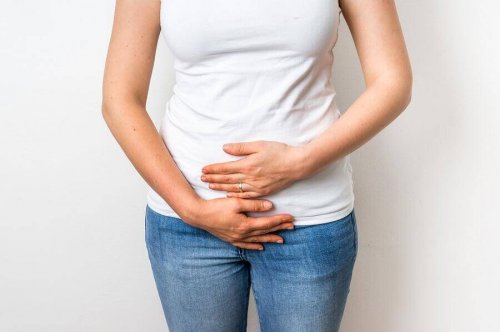What to Do to Avoid Ovarian Pain

A woman’s body is exposed to many changes during her menstrual cycles. These often cause disorders such as ovarian pain. In this article, we’ll share some tips to help prevent the onset of this symptom.
The ovaries are an important part of the female reproductive system, responsible for egg production. They’re also the main source of estrogen and progesterone. Many women experience occasional ovarian pain, generally related to several causes.
Menstrual cycle pain is the most common cause for some women. She might feel abdominal pain or nausea. However, once her period ends, everything goes back to normal.
If, on the other hand, the pain persists after your period ends, it’s important to consult your doctor to avoid any potential health complication.
What are the main causes of ovarian pain?
Most women complain of ovarian pain, which can be mild or severe. In addition, it can last from a few hours to several days. Sometimes, it’s even permanent.
Ovarian pain can occur:
- Before menstruation.
- Before and during ovulation.
- During pregnancy.
- Before, during, and after menopause.
Ovarian pain can also indicate:
- A more serious problem or illness.
- Inflammation or infection of the fallopian tubes.
- An ectopic pregnancy.
- An ovarian cyst.
- A tumor or ovarian cancer.
Ovarian pain can be mild or severe. In addition, it can last from a few hours to several days. Sometimes, it’s even permanent.
What to do to avoid ovarian pain
Everything depends on the causes of your ovarian pain, although the treatments can be pharmacological or surgical. In the event of an ectopic pregnancy, it must be terminated to save the woman’s life and reduce the risk of irreversible complications.
In case of chronic pain, gynecological monitoring is needed to ensure there are no ovarian malfunctions or endometriosis.
If no cause is found, the ovarian pain may be associated with anxiety or certain psychological disorders. However, some things can be done to avoid ovarian pain.
In most cases, women experience some form of ovarian pain after menstruation. Gynecologists specify that the pain is normal if it lasts for 2 to 3 days. However, if the pain persists, the woman should go see a doctor.
However, if you don’t have an infection or a health problem, you can reduce or even eliminate this pain. Around the middle of your menstrual cycle, it’s advisable to take the following steps:
- Lead a healthy lifestyle, including minimizing or avoiding alcohol and tobacco.
- Don’t eat too many sweets..
- Reduce the consumption of red meat and opt for a vegetarian diet.
- Exercise to avoid stress.
- Try to sleep 7 to 8 hours a day.
- Place a hot water bottle wrapped in a towel in your lower abdomen, specifically in the area between the navel, hips, and upper abdomen, to reduce pain and relieve muscle tension.
- Drink infusions with relaxing properties. Chamomile is a natural remedy for stomach pain and can also relieve ovarian pain.
- Gently massage your ovarian area for a few minutes.
These tips are easy to apply. Try to take them into account during your next cycle to avoid this pain before and after your period. As noted earlier, if your discomfort persists, please consult a specialist to rule out any health risk.
Ovarian pain is sometimes associated with stress

If you’re always stressed out, your body may react with pain in the right ovary after your period. Stress is bad for women, and also for men and children.
Thus, you have to focus on relaxing situations that don’t have a negative impact on your body. Yoga is a recommended practice, but it’s not for everyone.
Similarly, sports are good choices. However, there are no miracle solutions. You simply must find the discipline that gives you the most satisfaction. For some, swimming is perfect, while others enjoy running.
It’s also advisable to reduce your caffeine intake because it stimulates you, especially if you drink coffee after mid-afternoon.
Finally, note that this type of pain may or may not have a serious cause. Even if your pain isn’t severe, it’s important to tell your doctor about it to rule out any complications.
All cited sources were thoroughly reviewed by our team to ensure their quality, reliability, currency, and validity. The bibliography of this article was considered reliable and of academic or scientific accuracy.
- Samy A, Zaki SS, Metwally AA, Mahmoud DSE, Elzahaby IM, Amin AH, Eissa AI, Abbas AM, Hussein AH, Talaat B, Ali AS. The Effect of Zumba Exercise on Reducing Menstrual Pain in Young Women with Primary Dysmenorrhea: A Randomized Controlled Trial. J Pediatr Adolesc Gynecol. 2019 Oct;32(5):541-545
- Adib Rad H, Basirat Z, Bakouei F, Moghadamnia AA, Khafri S, Farhadi Kotenaei Z, Nikpour M, Kazemi S. Effect of Ginger and Novafen on menstrual pain: A cross-over trial. Taiwan J Obstet Gynecol. 2018 Dec;57(6):806-809.